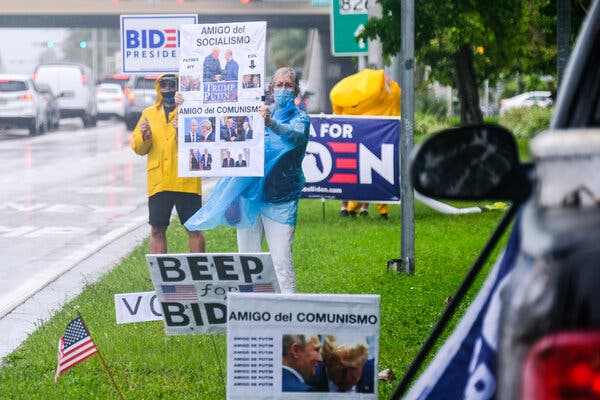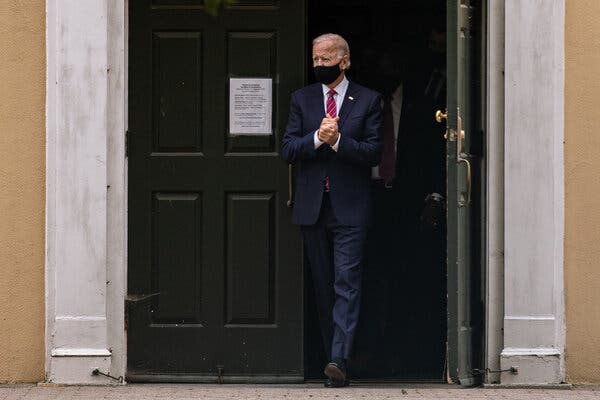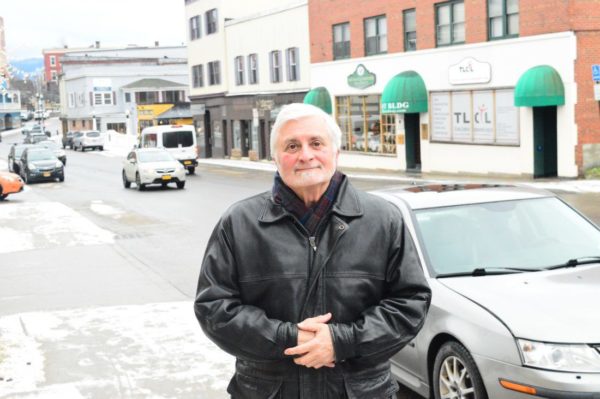Advertisement
Elections in Florida are won by running up margins in favorable terrain while losing more closely in hostile precincts. Joseph Biden visits the state on Tuesday for the first time since claiming the nomination.

LONGBOAT KEY, Fla. — As Linda Kanner hoisted groceries into her Volvo outside the Publix in this affluent Gulf Coast enclave last week, she unleashed a stream of invective toward President Trump to explain why she would “vote for Mickey Mouse” before an incumbent whose conduct she finds appalling.
A Midwestern Republican retiree like many voters here, Ms. Kanner is supporting Joseph R. Biden Jr., instead of shunning both major-party nominees as she did in 2016, because she finds him a more palatable option than she did Hillary Clinton.
Across the state in Miami, though, it’s Mr. Biden’s apparent slippage with Hispanics that’s garnering the most attention and has Democrats wringing their hands. Republican officials, and Mr. Trump himself, have repeatedly made overtures not just to Cuban-Americans who have been an enduring part of their coalition but to non-Cuban Hispanics, a growing and potentially pivotal voting group.
Mr. Biden is just as unlikely to win Longboat Key, in sleepy and mostly white Sarasota County, even with the support of voters like Ms. Kanner, as Mr. Trump is to prevail in Miami-Dade County, the pulsating and diverse Democratic hub across the state. Yet Florida, and the White House itself, could hinge on the two candidates’ ability to narrow their losses in such forbidding locales.
In an era of polarization, where swing voters are scarce, elections in Florida are won by driving up turnout among the faithful and running up margins in favorable terrain while losing more closely in hostile precincts. In a state so evenly divided that races are often decided by a few thousand votes — or, more memorably, a few hundred — mobilizing the converted outweighs preaching to the undecided few.
“The secret to Florida now is that it’s a margins game,” said Gwen Graham, a former congresswoman who worked for decades in the campaigns of her father, the governor-turned-senator Bob Graham.
That’s partly why Democrats were so stung last week by a federal appeals court decision that almost ensured that at least 774,000 former felons in the state — many of whom lean Democratic — would not be able to reclaim their voting rights this year without first paying all of their court fees. But the party received some good news over the weekend when the billionaire Michael R. Bloomberg, under pressure to make good on his promises, vowed to spend $100 million in Florida to help Mr. Biden win there.

Four years after Mr. Trump won Florida by just over a percentage point, polls show the state is, true to form, sitting on a knife’s edge — and looming again as a potential tipping point. On Tuesday, Mr. Biden will make his first trip to the state since claiming the nomination last spring. Mr. Trump has made a number of visits to the state, including last week.
If Mr. Biden is able to make inroads across the state’s Republican-rich retirement communities with voters who regret supporting Mr. Trump or voted third-party in 2016, it would greatly complicate the G.O.P.’s arithmetic. And should the president perform better with Hispanics than he did four years ago, and cut into Mr. Biden’s advantage in urban areas like Miami, it would all but block any Democratic path to victory in Florida.
It’s a departure from an earlier era, when the key to claiming this polyglot political jigsaw puzzle was wooing voters along the I-4 corridor across the middle of the state. Candidates from both parties beat a path to that stretch of highway because the electorate around Tampa and Orlando was up for grabs.Now, though, with surveys indicating that over 90 percent of voters know who they are supporting, the race could be decided by who does a better job turning out those who have already decided.
No voters appear more decisive than seniors, who polls show are more amenable to Mr. Biden than they were Ms. Clinton, and Hispanics, who the same surveys indicate are more supportive of Mr. Trump than they were in 2016.
“Cuban-Americans have consolidated more around Trump, and the thing that has not gelled for Joe as it should are Puerto Rican voters,” said former Senator Bill Nelson, a Democrat who is close to Mr. Biden. Mr. Nelson, who lost in 2018 in part because of Senator Rick Scott’s gains with Hispanics, said he had told Mr. Biden’s senior campaign staff about his concern.
Asked if they were acting on his plea, he said, “If they want to win, they better be.” Mr. Biden’s trip Tuesday will include a visit to the Puerto Rican community outside Orlando.
Amid the anxiety, Mr. Biden’s campaign dispatched his running mate, Senator Kamala Harris, to Miami last week, where she made an unscheduled stop at an arepa joint in Doral, home to so many Venezuelans that it is nicknamed Doralzuela.
The Democrats’ challenge with Hispanics is twofold: They have until recently avoided campaigning in person amid the pandemic, and Republicans have devoted years to courting Latinos in the one place in the country where they are less heavily Democratic.
Though Cubans have dominated the Hispanic vote in the state for decades, they now only narrowly outnumber non-Cuban Hispanics, 51 percent to 49 percent. That makes Puerto Ricans and Central and South Americans an attractive target for Democrats, who can more easily make inroads among those Democratic-leaning voters than among more conservative Cubans.
But winning over non-Cuban Hispanics requires the sort of time and money that the Biden campaign has only recently started to invest.
“It’s just typical: Taking communities for granted and thinking they’re going to deliver 30 days out from an election,” scoffed Ana Carbonell, a Republican and a senior adviser to Mr. Scott’s Senate campaign who specialized in outreach to Hispanics.
Perhaps more telling, some Latino voters are more comfortable with Mr. Trump than in 2016, when he trounced and belittled the local sons Jeb Bush and Senator Marco Rubio. And they are increasingly uncomfortable witnessing violence in American cities.
“There were a lot of people on the Hispanic side that said, ‘I don’t want to deal with him’ in 2016,” Ms. Carbonell said of Mr. Trump. “Now we have accepted this is who he is and they’re doing a little bit better financially and they had thought, ‘Well, Cubans have always been exaggerating’ — but now they’re seeing these anarchists on the streets and thinking, ‘Whoa, what’s going on?’”
A Biden ad on health care makes the personal political.
Sept. 14, 2020, 11:34 a.m. ET
Andrew Gillum, the former Democratic nominee for Florida governor, comes out as bisexual.
Sept. 14, 2020, 11:30 a.m. ET
Bob Woodward: Trump ‘could have saved lives’ by sharing the severity of the virus threat.



